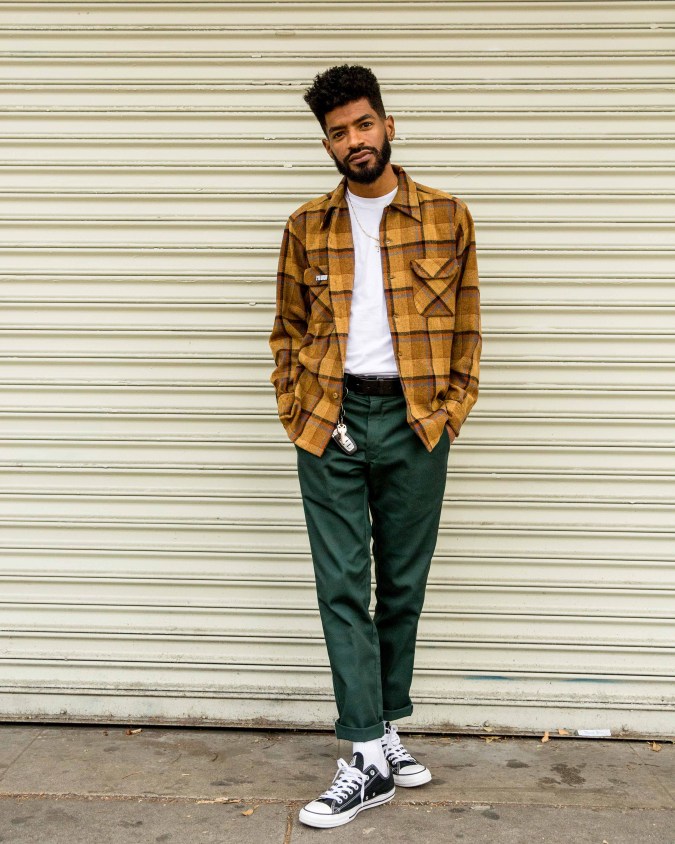Listening to Black Beans for the first time, one might wonder why an album like this hasn’t come before. The latest LP by Choosey combines hip-hop and lowrider oldies with inspiration sourced from his Mexican and African-American upbringing. Being Afro-Chicano immersed him in two cultures, which in Southern California have influenced one another for some time now.
Black Beans lyrically illustrates Choosey’s youth growing up near the U.S.-Mexico border, in National City and Chula Vista. He interlaces the strife faced by gentrification, mass incarceration, and criminalization of black and brown communities, while gifting us his memories of being in love, the tenderness of his parents’ relationship, and the ways lowrider culture captivated his imagination as a child. At the core, Black Beans is about the resilience of two communities and the album is authentically about Choosey’s personal story.
Produced by the West Coast beat master Exile, Black Beans is the perfect summer soundtrack – featuring outstanding collaborators like Ana Tijoux and Blu on the track “Brown & Beautiful,” Aloe Blacc on “Low Low,” Jimetta Rose on “You Got It,” and more. We sat down for a chat with the San Diego-based rapper.
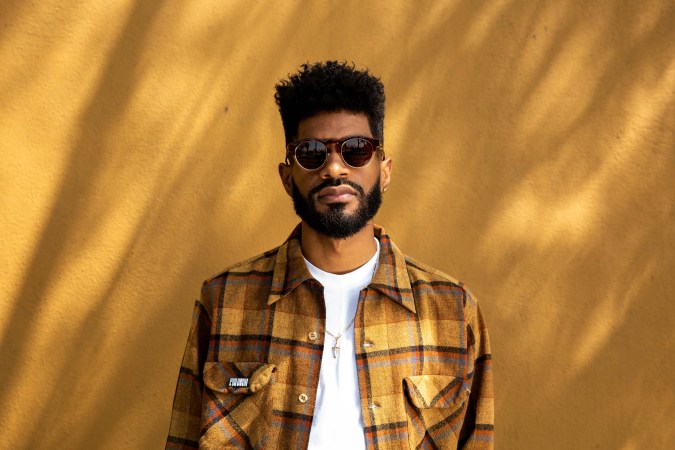
Black Beans seems very nostalgic but also experimental. What motivated you to create this sound?
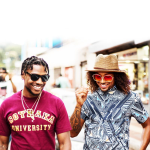
I’ve always been a fan of artists who step outside of the current wave, so I set my intentions do that as well. Our sound and process developed organically for sure. Exile and I established a direction and stuck to it. We wanted the listener to feel like they were hearing oldies and their favorite rap song at the same time – almost like a DJ was looping 45s while I rapped over them live. The creative part was easy and flowed well. The difficulty came with balancing everyday life stuff.
Not only does your album blend multiple genres, but it also intersects many social issues affecting communities of color. How did Afro-Chicanismo inform your perspective?
Fortunately, I had both parents in my household and I felt just as Black as I felt Mexican. My direct point of reference was two races who’d been oppressed in similar yet very different ways, living in one home – in harmony. That gave me a mentality that could not be suppressed cause I knew otherwise. I knew our similarities first hand and I was literally living what disproved the stigmas between my people everyday. Growing up, I’d be hangin with an all Black crowd who’d say something racist about Mexicans and I’d have to remind em like “Yo, that’s my people!” and vice versa when I’d be with my Mexican homies. That allowed me to see the division in both sides while at the very same time, more often than not, I’d witness the beauty of us all getting along. Black and Brown love was making absolutely no headlines at the time while propaganda like‘Black on Black Crime’ was one of the hottest topics of the 90s. I knew of a truth untold – a truth that I was a direct product of.
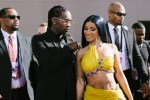
Growing up, what was the music being played in your home? From these sounds, what influenced you?
There was a lot of gospel music in our home which came from my mom. I know if it were up to my dad, there would be a lot more Tower of Power or Ralfi Pagan playing though. Despite the fact my mom didn’t allow too much “secular” music to be played in our home, I’d get a good dose of Earth, Wind and Fire, Joe Bataan, Brenton Wood, Stevie Wonder, SWV, Anita Baker, Curtis Mayfield and The Dells on the regular. When I got a bit older and had my own collection, it was mostly gangster rap, underground hip-hop, and any sweet soul I could get my hands on. The most influential music I heard was anything with good melodies. The harmonious vocals of The Supremes or The Stylistics just activated something in me that I still can’t really explain to this day. It’s that feeling when you want to cry but there’s nothing to cry about, you know what I mean? It just activates my spirit and it hits me harder than what the lyrics could ever say.
“We wanted the listener to feel like they were hearing oldies and their favorite rap song at the same time.”
You mentioned to me that your grandfather was a jazz musician in East L.A. Tell us more about your musical lineage and if it’s shaped your artistry?

Yes, Tata Vasquez! Rest his soul. He was in and out of a few bands his whole career. His claim to fame was playing in Eddie Cano’s band and he also played in the film Rock Around The Clock with big names such as the Platters [and others]. He taught me so much about music theory without really even trying. There was this one day where I was messing around on the piano, struggling to remember some notes and he stopped me, pressed against my chest firmly, and in a frustrated way he repeated “Play from here! Play from here!.” I owe so much to that lesson. I carry that with me every time I create a song.I’ll stop myself in the midst of writing or recording if I feel the influence coming from somewhere other than my soul.
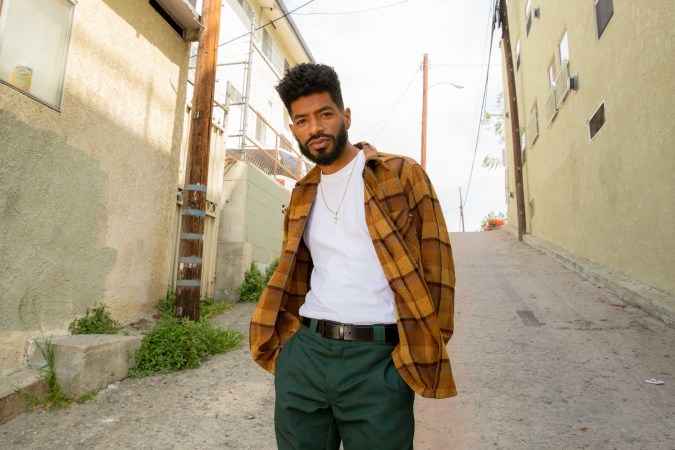
You took your time making this album. Where were you emotionally, and did you find anything healing in your creative journey?
It was such a healing journey. I’d been going through a serious break up, realizing I had a sight threatening eye condition, struggling to make money to fund the surgery for my condition (which ended up being $10,000 out of pocket cause no insurance covers it), and so much more. It was a lot of hell to be honest. Like most Black and Brown people in America, our last decade (and entire existence) has been trying to say the least. I was angry during the writing of this album – watching my people get murdered in cold blood by police and watching children get stripped from their families, then put into cages. It was like every time I looked up, my people, on both sides, were being attacked. I was on edge and at times feeling hopeless but somehow, through the grace of God, the light came. I re-channeled all that anger and decided to express the joy and beauty my ethnicities possess, the fight in our hearts that could never be extinguished, and the relentless will to overcome. That was my therapy.
How did you decide on the album cover, and what is the story behind the picture of you and your father?
I showed the picture to Exile a while back, before we’d even decided to make an album together, and he always loved it. We recorded some songs and started tossing ideas around for the artwork but couldn’t really narrow down a cover. I woke up one day and told Ex “trust me, we already have album cover and we’ve had it for a long time now.” He agreed and we stuck with it. It definitely lives up to the “A picture is worth 1,000 words” saying and it embodies Black Beans to the fullest. The dopest part about that album cover is my dad was the same age I am now in that photo. My sister figured that out a couple of weeks ago.
What are you working on now? What are your dreams for the future?
I’m working on a ton of music. Exile and I already have an album’s worth of material and I have vaults of self produced music I’m working on as well. I’m writing and composing a lot these days so the fans will get some of my best and most heartfelt music in due time, sonically and lyrically. I’m also a graphic designer so I have my hands in fashion projects as well as creative direction. There’s definitely a lot in store from me but I truly prefer to show and prove vs. talk about my next move(s). I guess we’ll see in the very near future if the universe agrees with my next ventures.
Choosey’s new album Black Beans is available now on all major music platforms.
Follow him on instagram @kingchoosey
